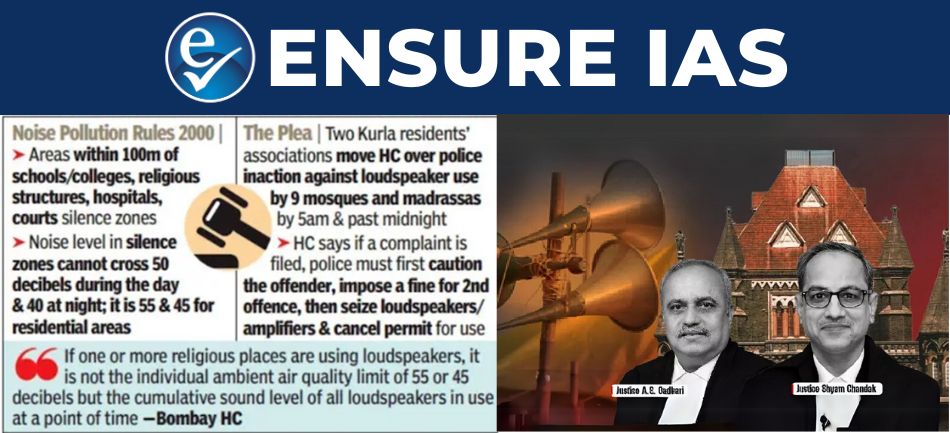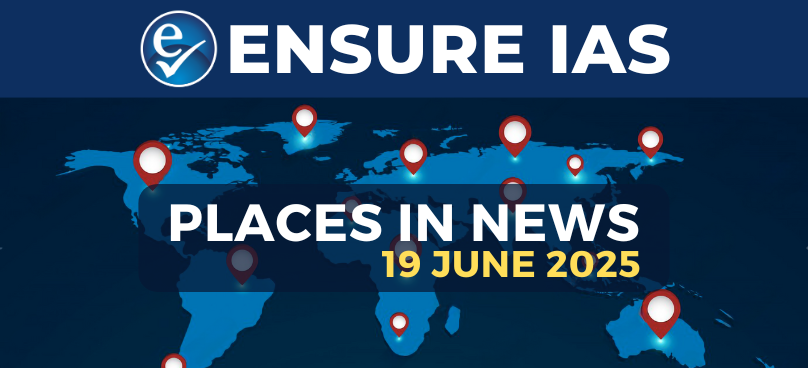- Courses
- GS Full Course 1 Year
- GS Full Course 2 Year
- GS Full Course 3 Year
- GS Full Course Till Selection
- Answer Alpha: Mains 2025 Mentorship
- MEP (Mains Enrichment Programme) Data, Facts
- Essay Target – 150+ Marks
- Online Program
- GS Recorded Course
- Polity
- Geography
- Economy
- Ancient, Medieval and Art & Culture AMAC
- Modern India, Post Independence & World History
- Environment
- Governance
- Science & Technology
- International Relations and Internal Security
- Disaster Management
- Ethics
- NCERT Current Affairs
- Indian Society and Social Issue
- NCERT- Science and Technology
- NCERT - Geography
- NCERT - Ancient History
- NCERT- World History
- NCERT Modern History
- CSAT
- 5 LAYERED ARJUNA Mentorship
- Public Administration Optional
- ABOUT US
- OUR TOPPERS
- TEST SERIES
- FREE STUDY MATERIAL
- VIDEOS
- CONTACT US
Bombay HC Ruling on Use of Loudspeakers in Religious Practices
Bombay HC Ruling on Use of Loudspeakers in Religious Practices

- On January 23, 2025, the Bombay High Court ruled that the use of loudspeakers in religious practices is not essential to religion.
- The Court also said that loudspeakers, if they cause noise pollution, cannot be claimed as a fundamental right under the Constitution of India.
Key Points of the Ruling:
-
Core Issue:
- This ruling came in response to a petition filed by residents’ associations from Kurla and Chunabhatti areas in Mumbai.
- They complained about loudspeakers being used in mosques and madrasas that exceeded the legal decibel limits and were used during prohibited hours.
- The court had to decide if the use of loudspeakers in religious places could be considered a basic religious practice that should be protected by law, even if it causes noise pollution.
- This ruling came in response to a petition filed by residents’ associations from Kurla and Chunabhatti areas in Mumbai.
-
Court's Decision:
- The Bombay High Court ruled that loudspeakers are not an essential religious practice, and therefore, they cannot be considered a fundamental right under Article 25 (right to practice religion) or Article 19(1)(a) (freedom of speech).
- The Court also said that noise pollution caused by loudspeakers affects the health and peace of the public, and public health should take priority over religious practices that cause noise.
-
Legal Framework:
- Noise Pollution (Regulation and Control) Rules, 2000 limit noise levels:
- In residential areas:
- Daytime (6 am to 10 pm): Maximum of 55 decibels.
- Nighttime (10 pm to 6 am): Maximum of 45 decibels.
- In residential areas:
- Therefore, The Court explained that loudspeakers in religious places must follow these limits, even if they are used for religious purposes.
- Moreover, Maharashtra Police Act, Section 38 allows the police to stop loudspeakers or sound systems if they cause noise pollution.
- Noise Pollution (Regulation and Control) Rules, 2000 limit noise levels:
-
Specific Findings in the Case:
- In an affidavit filed by the police in November 2023, the noise levels at 2 mosques in Kurla were found to be:
- 79.4 decibels at one mosque.
- 98.7 decibels at another mosque.
- These levels were well above the legal limits of 55 decibels during the day and 45 decibels at night, which confirmed violations of the noise pollution rules.
- In an affidavit filed by the police in November 2023, the noise levels at 2 mosques in Kurla were found to be:
-
Cumulative Noise Impact:
- The Court said that when several places of worship use loudspeakers at the same time in the same area, the total noise (from all sources) should be considered, not just the noise from each individual loudspeaker.
- This means that the noise levels from multiple sources can exceed the legal limit even if each source is within the legal limit on its own, especially in crowded areas.
-
Directions to Authorities:
- The Court directed the authorities to handle complaints about noise pollution in a way that protects the identity of the complainants, so they are not targeted or harmed by those they report.
- The Court also recommended that the State Government put in place measures to control decibel levels in loudspeakers by using technology to set limits in loudspeakers used in religious places.
- Moreover, The Court ordered that the Mumbai Police Commissioner ensure police officers use mobile applications to measure noise levels when investigating complaints about loudspeakers.
- Graded Penalty System: The Court introduced a 4-step penalty system to handle violations of noise levels:
- 1st-time offenders: The organization responsible for the loudspeakers will receive a warning.
- Repeat offenders: The responsible organization will have to pay a fine, and they will be warned of stronger actions if they continue to violate the rules.
- Continued violations: The police can seize the loudspeakers, cancel licenses for their use, and file legal complaints against the violators.
- This system is designed to give offenders a chance to correct their actions before harsher penalties are imposed.
-
Contempt Plea for Unauthorized Loudspeakers:
- The Court also heard a contempt plea related to 2,940 loudspeakers being used without permission.
- The Court has scheduled a next hearing for March 18, 2025, where the government must report what actions have been taken to address these unauthorized loudspeakers.
-
2016 Precedent:
- The Court referred to the 2016 judgment in Dr. Mahesh Vijay Bedekar v Maharashtra, which made it clear that loudspeakers are not essential for religious practices.
- The 2016 ruling also stated that loudspeakers cannot be claimed as a fundamental right under Article 25 (freedom of religion) or Article 19(1)(a) (freedom of speech).
- It imposed restrictions on the use of loudspeakers:
- Loudspeakers cannot be used between 10 pm and 6 am, except for religious or cultural events for up to 15 days per year.
- Silence zones are areas within 100 meters of places like schools, hospitals, courts, and religious places where the use of loudspeakers is banned.
- The ruling allowed exceptions for closed venues like auditoriums or in cases of emergencies.
-
Silence Zones:
- The Court emphasized the importance of silence zones, which are defined as areas within 100 meters of:
- Schools, hospitals, religious places, courts, and colleges.
- In these zones, the use of loudspeakers and horns is strictly prohibited to maintain a peaceful and quiet environment.
- The Court emphasized the importance of silence zones, which are defined as areas within 100 meters of:
Article 19: Protection of Certain freedom like Freedom of Speech, etc.19(1) following freedoms are guaranteed:
Originally, Article 19(1) had 7 rights. But, the right to acquire, hold and dispose of property Article 19(1)(f) was removed by the 44th Amendment Act of 1978 from the list of Fundamental Rights and was made a legal right under article 300A. Following Reasonable Restrictions have been put by different clauses of same article 19
Right To Freedom Of Religion (Articles 25 To 28)Article 25 - Freedom of Conscience and Free Profession, Practice and Propagation of Religion:Everyone is entitled to freedom of conscience and the right to freely profess, practice and propagate religion. Explanation:
Thus, Article 25 covers not only religious beliefs (doctrines) but also religious practices (rituals). These rights are available to all (citizens as well as non-citizens). Restriction on this right:
Article 26 - Freedom to Manage Religious Affairs:Every religious denomination (or its section) have following rights:
As per Supreme Court, 3 conditions for being a religious denomination:
As per above criteria, the SC held that ‘Ramakrishna Mission’ and ‘Ananda Marga’ are religious denominations within the Hindu religion but Aurobindo Society is not a religious denomination. |
|
Also Read |
|
FREE NIOS Books |
UPSC Daily Current Affairs |
UPSC Monthly Mgazine |
Previous Year Interview Questions |
Free MCQs for UPSC Prelims |
UPSC Test Series |
ENSURE IAS NOTES |
Our Booklist |




